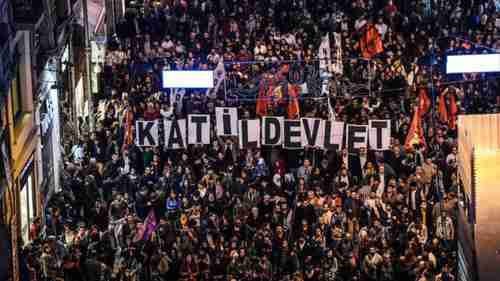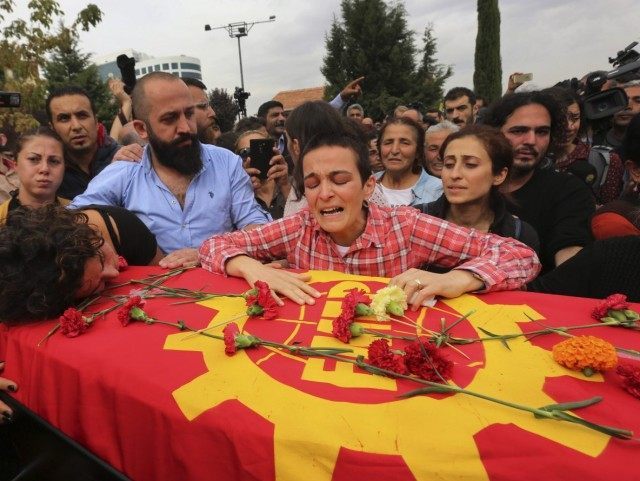This morning’s key headlines from GenerationalDynamics.com
- Turkey blames ISIS for Saturday’s massacre as anti-government anger grows
- Turkey is seen as increasingly unstable after massacre
Turkey blames ISIS for Saturday’s massacre as anti-government anger grows

Anti-government protesters carry placards reading, ‘The Murderous State’
Turkey is in a state of shock over Saturday’s massive terrorist attack at a “peace rally” in the capital city Ankara that killed 97 people and injured hundreds more. It’s being referred to as the worst terrorist massacre in Turkey’s history, or as “Turkey’s 9/11.”
Turkey’s Prime Minister Ahmet Davutoglu on Monday named the so-called Islamic State (IS or ISIS or ISIL or Daesh) as the principal suspect in the massacre. According to Davutoglu:
From the first moment on, we have viewed Daesh [ISIS] as being responsible, considering how the incident happened.
That is not exactly true. From the first moment on, Davutoglu actually said that he viewed ISIS to be one of four possible perpetrators, the principal other one being the Kurdistan Workers’ Party (PKK). And this claim infuriated Kurds, since the “peace rally” was a gathering of Kurdish activists. ( “11-Oct-15 World View — Turkey’s terror attack triggers vitriolic political finger-pointing”)
Instead of unifying Turkey’s people behind the government to find the perpetrators, the Turkish people are becoming more polarized, frustrated and angry, with many people blaming the government of president Recep Tayyip Erdogan.
Those who blame the government split into several categories:
- Most simply say that Saturday’s Kurdish peace rally was at risk, and yet the Erdogan government took no precautions to protect the rally — as it does with pro-government rallies.
- Some are much darker, blaming Erdogan for giving the order to bomb the Kurdish peace rally, in order to blame the Kurds and get an excuse to order military action against Kurdish targets in southeastern Turkey.
- Some blame Erdogan for inciting nationalism and fomenting violence between Kurds and Turkish security forces, in order to give Erdogan an advantage in the November 1 elections.
- Some blame Erdogan giving permission for US-led coalition air strikes to be launched from Turkey’s Incirlik Air Base.
- Some blame Erdogan for being too tolerant of ISIS, and revive old accusations that Erdogan funded ISIS to fight the regime of Syria’s president Bashar al-Assad.
Today’s Zaman (Turkey) and Hurriyet (Turkey) and Today’s Zaman
Turkey is seen as increasingly unstable after massacre
Four or five years ago, Turkey appeared to be a pillar of strength, with enormous influence throughout the Mideast. There had been occasional terrorist attacks by the PKK, but even that seemed a thing of the past when Turkey’s government and the PKK agreed to a ceasefire and a “peace process” in 2013.
However, things changed abruptly, following the July 20 terrorist attack in the city of attack on Suruç killing 33 people, mostly young pro-Kurdish activists. After that, the ceasefire agreement broke down, and Erdogan declared war on the PKK. ( “9-Sep-15 World View — Turkey slips into chaos as violence spreads across the country”)
Turkey has been suffering a spiral of violence. Saturday’s terrorist attack took place in Ankara, near government buildings, presumably the safest place in Turkey. People are wondering where the terrorists will strike next. The economy is suffering, tourism is falling, and the lira currency is losing value.
Erdogan’s Justice and Development Party (AKP) lost its parliamentary majority in the June 7 parliamentary election for the first time since 2002, after the Kurdish Peoples’ Democratic Party (HDP) got 12% of the vote, surpassing a 10% threshold for the first time, giving the party a significant representation in the parliament.
In a move that now appears to be ill-fated, Erdogan called for new parliamentary elections on November 1, hoping to regain the seats that his party had lost to the Kurds. However, polls indicate that the HDP may actually do better on November 1 than it did on June 7, and there are concerns that the splintered government will not be able to govern effectively.
There are fears that the polarization between the government and the PKK will turn into a civil war. Prime Minister Ahmet Davutoglu said on Monday, “These attacks won’t turn Turkey into a Syria,” but that’s exactly what many people are afraid of. CBS News and Today’s Zaman
KEYS: Generational Dynamics, Ankara, Turkey, Recep Tayyip Erdogan, Kurds, Justice and Development Party, AKP, Ankara, Ahmet Davutoglu, Islamic State / of Iraq and Syria/Sham/the Levant, IS, ISIS, ISIL, Daesh, Suruç, Peoples’ Democratic Party, HDP, Incirlik Air Base
Permanent web link to this article
Receive daily World View columns by e-mail

COMMENTS
Please let us know if you're having issues with commenting.